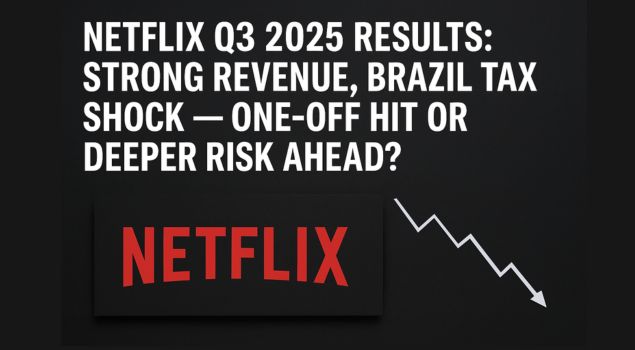“A strong quarter clouded by a costly surprise.”
Netflix’s third-quarter 2025 results landed with a mix of applause and anxiety. While the streaming giant reported impressive revenue growth and continued global subscriber momentum, its bottom line took a heavy hit from an unexpected one-time charge — a tax dispute in Brazil.
The news rattled investors, sending Netflix shares sliding in after-hours trading and sparking debates about how this might ripple through the U.S. and global markets.
Netflix Q3 2025 at a Glance
Netflix posted another quarter of strong top-line growth, driven by new pricing tiers, the expansion of its ad-supported plan, and a slate of global content hits.
- Revenue: around $11.5 billion, up roughly 17% year-over-year
- Net Income: profit increased from last year, but margins contracted
- Earnings per Share (EPS): came in at $5.87, below market estimates of around $7
- Operating Margin: dented by a $619 million charge related to Brazil
“The Brazil charge is a one-time hit, but its timing couldn’t have been worse — just as Netflix was enjoying investor confidence in its ad-tier growth story.”
The Brazil Dispute Explained — A One-Time Tax Trap
The shocker in the Q3 results wasn’t about content spending or subscriber churn — it was taxation.
Brazil’s tax authorities have been reassessing how cross-border payments for digital services are treated. The core issue? A 10% tax applied retroactively on certain payments to overseas entities, which Netflix had previously classified differently.
As a result, the company had to take a $619 million provision to settle or account for the potential liability, slicing into its quarterly profit and margins.
While Netflix called the charge a “non-recurring event,” the market’s reaction was swift. Investors dislike surprises — especially those involving regulatory disputes in large emerging markets.
“Brazil’s digital tax assessment highlights a growing global trend — governments tightening their grip on cross-border tech revenues.”
Immediate Market Reaction
Stock Selloff
In after-hours trading, Netflix shares dropped nearly 8%, erasing a chunk of its year-to-date gains. The selloff extended into the next trading day, briefly pulling down the broader Nasdaq Communication Services index.
Investors viewed the Brazil charge as more than a one-off — it reignited concerns about Netflix’s international exposure and the risk of similar actions from other countries.
Sector Sentiment
The drop also affected peers in the streaming and media sector. Disney, Warner Bros. Discovery, and Paramount saw mild declines as traders reassessed regulatory risks in key foreign markets.
“This isn’t about Brazil alone — it’s about the precedent it sets. Every multinational streaming company now has to ask: Who’s next?”
U.S. and Global Market Implications
While Netflix’s market cap is substantial, its single-quarter charge isn’t large enough to shake U.S. indices in isolation. However, the symbolic impact matters.
- For the U.S. market:
The selloff dampened sentiment in growth and communication stocks, particularly as investors are already cautious amid high Treasury yields and concerns about a global slowdown. - For global markets:
Brazil’s move could embolden other nations to revisit digital tax frameworks, particularly in regions where streaming platforms have seen explosive growth but pay limited local taxes. - Currency and macro angle:
The dispute highlights another challenge for multinationals — currency translation and regulatory risk in emerging economies. Investors may increasingly favor companies with diversified geographic risk management.
“The Netflix-Brazil story is a reminder that growth abroad comes with governance abroad.”
What Analysts Are Saying About Netflix’s Stock
Despite the short-term hit, most analysts remain constructive on Netflix’s long-term story. The consensus 12-month price target remains around $1,350–$1,400, implying a 10–15% upside from post-earnings levels.
Bullish View
Analysts at Morgan Stanley and Goldman Sachs noted that the Brazil issue is likely a “contained, one-time accounting charge” that doesn’t affect Netflix’s operational trajectory. They highlight that the company’s advertising business is scaling faster than expected, and its global content strategy continues to drive subscriber engagement.
They also see margin expansion returning in 2026 as the ad tier contributes higher ARPU (Average Revenue per User).
“Once the dust settles, Netflix’s fundamentals — content, pricing power, and ads — still make it a standout growth story.”
Bearish View
On the other side, skeptics warn that Netflix’s expanding global footprint increases exposure to regulatory and taxation uncertainties. Analysts at Bernstein and Bank of America trimmed their near-term targets to around $1,100–$1,200, citing potential for similar rulings in other markets like India or the EU.
They also note that the company’s rising content costs and competitive pressures could limit its margin recovery.
“Netflix’s Brazil setback may be isolated — but it won’t be the last tax headline we see for digital platforms.”
Investment Takeaways
Short-Term
Volatility is likely to persist. Institutional investors may trim positions while waiting for clarity on the Brazil outcome and any commentary from Netflix’s legal or finance teams.
Medium-Term
If the dispute truly proves non-recurring, Q3 2025 might be remembered as a temporary stumble rather than a turning point. The company’s ad-tier growth, password-sharing crackdown success, and content leadership remain compelling growth drivers.
Long-Term
Netflix’s strategy of expanding ad-based streaming and bundling with local telecoms is strengthening its moat. If margins normalize post-Brazil, the stock could easily revisit the $1,400–$1,500 range in 2026, assuming no new regulatory shocks.
“Smart investors see through noise — they buy quality franchises when headlines create fear.”
The Bigger Picture — Lessons for Global Markets
The Netflix-Brazil episode underscores a new reality: as digital giants expand globally, they face not just market risk but sovereign risk. Countries are reasserting control over cross-border digital income, and this could become a recurring theme for tech and streaming companies alike.
For the global investor community, this marks a shift from purely growth-based valuations to risk-adjusted growth, factoring in how taxes, regulation, and localization costs can reshape profitability.
“In 2015, the risk was content cost. In 2025, the risk is compliance cost.”
Bottom Line
Netflix’s Q3 2025 results tell a story of strength overshadowed by surprise. The Brazilian tax charge was costly but likely contained. Its fundamentals — subscriber growth, pricing power, and advertising traction — remain intact.
The stock’s near-term volatility may present an opportunity for long-term investors who believe in the global streaming story.
As one portfolio manager put it:
“Netflix just reminded Wall Street that even streaming isn’t tax-free. But for those with patience, this dip may stream profits in the long run.”

